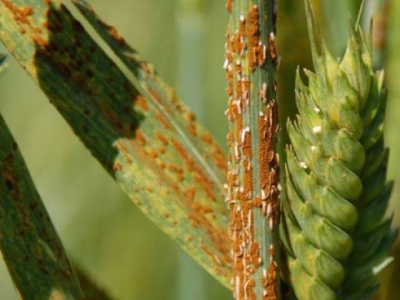New gene cloning method may speed development of rust-resistant crops

Disease resistance genes from wild relatives could be used to engineer broad-spectrum resistance in domesticated crops.
A new method for discovering and cloning genes could accelerate the development of rust resistance in wheat and other crops.
In a study published in the journal Nature Biotechnology, scientists at the University of Minnesota, along with colleagues in England and Australia, describe a new method for discovering and cloning not just one but potentially the entire complement of disease resistance genes in a plant species.
The cloning protocol, dubbed Association Genetics Resistance Gene Enrichment Sequencing (AgRenSeq), is based on the fact that many disease resistance genes in plants possess a unique DNA sequence. By specifically targeting and enriching this sequence in the genome of the wild wheat species Aegilops tauschii, researchers efficiently isolated four resistance genes within just six months — a process that would normally take a decade or longer for just a single gene, the University of Minnesota said in a news release. A. tauschii is one of the three progenitor species that contributed to modern bread wheat.
“AgRenSeq is a significant breakthrough that will facilitate and accelerate the development of more durable, resistant varieties not only for wheat but many important crops,” said University of Minnesota plant pathology professor Brian Steffenson, a co-lead on the project. “With a large pool of resistance genes in hand, we can breed new varieties with broad-based, multi-gene resistance that will minimize losses to disease.”
Wheat is one of the most important food crops in the world, supplying nearly 20% of the calories humans consume. To feed the burgeoning world population, losses due to disease must be minimized.
Stem rust is considered the most devastating of the many diseases attacking wheat worldwide, the news release said. Stem rust is caused by a fungus whose microscopic, reddish-orange spores can infect and destroy wheat crops across a wide area within a short period of time. In the U.S., Minnesota and the Dakotas are especially prone to stem rust and have suffered three great epidemics the last century.
Developing resistant varieties of wheat is the most effective, economical and environmentally friendly way to control stem rust and many other diseases. However, this strategy has provided only short-term control of wheat diseases due to the evolution of new pathogen races that can overcome the few resistance genes bred into a particular wheat variety.
The new approach discovered by Steffenson and his team holds great promise for countering the evolutionary potential of the pathogen because it incorporates many resistance genes into a given wheat variety instead of just a few, the University of Minnesota noted.
This new strategy requires the identification of many new genes for disease resistance and their systematic transfer into a new variety of wheat while maintaining all of the desirable attributes for yield and end-use quality.
“This genetic engineering protocol may usher in a new revolution of plant breeding where crops can be made more resilient to withstand the onslaught of pathogens and insects alike,” Steffenson said. “These resistant crops will be critical for feeding the world in the coming decades.”
Source: The University of Minnesota, which is solely responsible for the information provided and is wholly owned by the source. Informa Business Media and all its subsidiaries are not responsible for any of the content contained in this information asset.
Related news
 Rice firms face bankruptcy as trade face difficulties
Rice firms face bankruptcy as trade face difficulties A series of companies who rushed to trade rice a decade ago are now facing difficulties and in some cases, have gone bust.
 High demand from Korea, Japan for Vietnamese fruits, vegetables
High demand from Korea, Japan for Vietnamese fruits, vegetables With their high demand for agricultural products, South Korea and Japan offer opportunities for Việt Nam to boost export of farm produce, especially fruits
 Organic farming: a commercial farmer converts
Organic farming: a commercial farmer converts Peter Nicholson of Roselands farm near Richmond in KwaZulu-Natal believes organic farming can be used to sustainably feed the world.